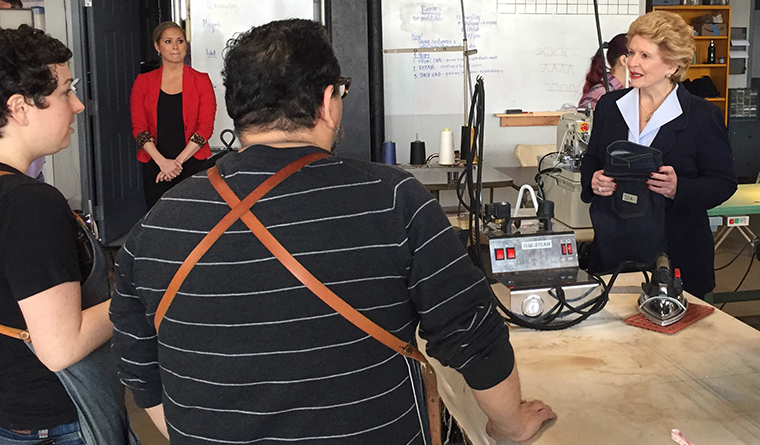American Jobs Agenda

Senator Stabenow is laser-focused on creating jobs here in America. Her American Jobs Agenda will ensure we are making products in America, closing loopholes that send jobs overseas, and holding countries like China accountable for unfair trade practices.
Make It In America Act
During her small business tour across Michigan, Senator Stabenow visited Grand Haven in August 2016 and met with the CEO of R.A. Miller Industries (RAMI), a manufacturer of high-tech products for our military. RAMI’s CEO expressed concern that our Buy American policies, meant to give priority to American companies when the federal government purchases goods, weren’t working.
Senator Stabenow investigated and found that RAMI was right. From 2012 to 2016, the federal government awarded over $70 billion in contracts to foreign companies that do not manufacture products here in the United States. In response, Senator Stabenow got to work and went back to RAMI to announce her Make It In America Act to create
more opportunities for Michigan businesses and Michigan jobs.
Putting American-Made Goods First
It’s just common sense that American tax dollars should be used to purchase products made in America, not overseas. However, Buy American requirements can be waived in certain instances, without a lot of public accountability.
The Make It In America Act would create stricter guidelines to make it harder for federal agencies to use waivers to get around Buy American requirements. This will level the playing field for American companies, and especially help our small businesses and start-ups compete for federal contracts. Stabenow’s bill requires the government to consider the impacts on U.S. employment when awarding contracts. It also increases transparency by requiring agencies to report to Congress on the amount of taxpayer dollars spent on foreign made goods, which would help us hold agencies accountable for how they spend taxpayer dollars.
Bring Jobs Home Act
Our tax code currently allows companies that close up shop and move jobs overseas to write off all of the costs of the move on their taxes. Not only does that mean workers and communities lose their jobs, but their tax dollars are used to help the company move to another country!
Ends Tax Breaks for Companies that Move Overseas
The Bring Jobs Home Act closes a tax loophole that currently rewards companies for moving jobs abroad. By exploiting a loophole in section 162 of the Tax Code, companies can deduct the cost of moving their businesses to other countries when filing their taxes. This bill would change the law so that companies moving jobs overseas cannot deduct their expenses for doing so, effectively ending a subsidy for companies that export jobs.
Creates a New Tax Cut
The bill would provide a tax credit for companies that move jobs and business activities from another country back to America. By allowing companies to qualify for a tax credit equal to 20 percent of the cost associated with bringing jobs and business activities to the U.S., the Bring Jobs Home Act provides a large incentive for companies to move back home.
The Bring Jobs Home Act will grow the economy and bring jobs home to Michigan. Senator Stabenow first introduced this legislation in 2012, and in every Congress since then. Senate Republicans have repeatedly blocked it from passing.
Stronger Trade Enforcement
Senator Stabenow is leading the effort to strengthen enforcement against countries that manipulate their currency, which hurts our businesses and workers and has cost our country as many as five million jobs. As Co-Chair of the bipartisan Senate Manufacturing Caucus, she partnered with Republican Senator Rob Portman of Ohio in authoring legislation that required strong, enforceable measures to address currency manipulation in any new trade agreement.
Senator Stabenow also led the successful effort to make permanent a new trade enforcement center to monitor and enforce our trade laws. The center is responsible for cracking down on countries that are breaking the rules so our businesses and workers can fairly compete. She will continue to lead efforts to make sure trade enforcement has the staff and resources they need to be effective.
Given the importance of manufacturing to Michigan’s economy, Stabenow is also the sponsor of an effort to create a Chief Manufacturing Negotiator to make sure Michigan manufacturers have a seat at the table and are part of all trade negotiations.
















